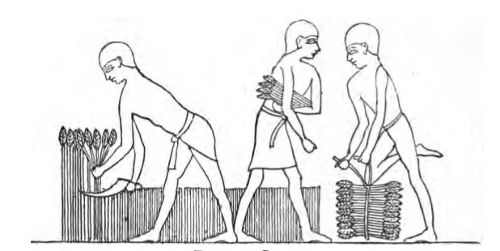
Egyptian Reapers4.
In this fertile land the cultivation5 of corn was very primitive6; the sower had his seed in a basket, which he held in his left hand, or suspended it either on his arm or by a strap7 round his neck, and he threw the seed broadcast with his right hand.21 According to the paintings in the tombs, he immediately followed the plough, the light earth needing no further treatment, and the harrow, in any form, was unknown. Wheat was cut in about five months after planting, and barley in about four. We have here a representation of harvesting, showing the reaping, with the length of stubble left, and its being tied up into sheaves, or rather bundles. We next see the bundles being made into pyramidal stacks.
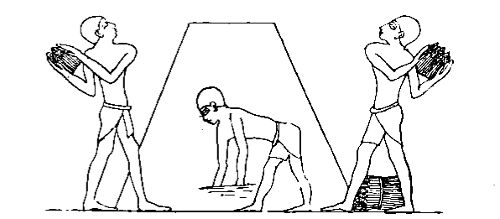
Egyptians Stacking Corn.
Here it remained until it was required for threshing, and then it was transported to the threshing floor in wicker baskets, upon asses8, or in rope nets borne by two men. These threshing floors were circular level plots of land, near the field, or in the vicinity of the granary; and, the floor being well swept, the ears were laid down and oxen driven over it in order to tread out the grain, which was swept up by an attendant.
And, like their modern brethren, they were merry at their work and sang songs, several of which may22 be seen in the sculptured tombs of Upper Egypt. Champollion gives the following, found in a tomb at Eileithyia:
‘Thresh for yourselves (twice repeated),
O oxen,
Thresh for yourselves (twice repeated);
Measures for yourselves,
Measures for your masters.’
Sometimes the cattle were bound by their horns to a piece of wood, which compelled them to move in unison9, and tread the corn regularly. But it was also threshed out by manual labour, with curious implements10. The next operation was to winnow11 the corn, which was done with wooden shovels12; it was then carried to the granary in sacks, each containing a certain quantity, which was determined13 by wooden measures, a scribe noting down the number as called by the tellers14, who superintended its removal. Herodotus (book II., 14) says that the Egyptians trod out their corn by means of swine.
Besides the growing and gathering15 of wheat, the doura is also represented in paintings in tombs at Thebes, Eileithyia, Beni-Hassan, and Saggára. Both it and wheat are represented as growing in the same field, but the doura is the taller of the two. It was not reaped, but was pulled up by the roots by men, and sometimes women, who struck off the earth which adhered with their hands, bound it in sheaves, and carried it to a place where it was rippled16, as flax is done.
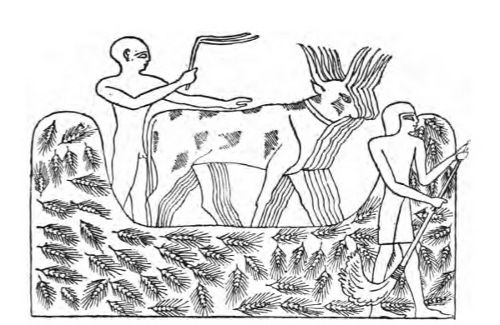
Egyptians Threshing.
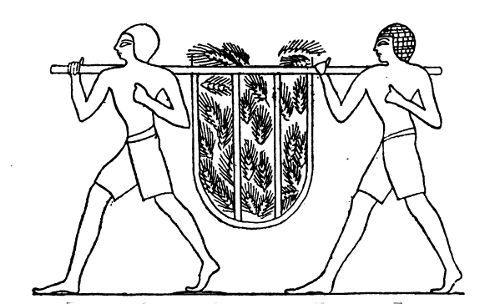
Egyptians Carrying Grain to the Threshing Floor.
In the ordinary life of the Egyptians, the woman mealed the flour—in as primitive a form as the pre23
24historic man—and in the British Museum are two wooden models, which show the first process of converting the cereal into meal; and then we have two figures of men kneading dough17—from the Museum at Ghizeh (formerly at Boulak). The bread itself was both leavened18 and unleavened—as may be seen by the many examples—round, triangular19, and square—in the British Museum, some of which must have been a foot across, and over an inch thick; the three examples given on page 27 being 5in. in diameter, and 1/2in. thick; 7 ditto and 1/2 ditto; whilst the ornamented20 cake is 3-1/2in. in diameter and 3/4in. thick.
But there were professional bakers21 in Egypt, as we see in some of the tomb-pictures. In the Biblical story of Joseph we find that ‘the butler of the King of Egypt and his baker22 had offended their lord the King of Egypt’; and the Rabbi Solomon says their offences were the butler not having perceived a fly in Pharaoh’s cup, and the baker having got a stone into the royal bread, so that Pharaoh thought they were conspiring23 against his life. We know they were put in prison with Joseph, and related their dreams to him. The dream of the Opheh, or chief baker, was that he ‘had three white baskets on his head, and in the uppermost basket there was all manner of bake meats for Pharaoh.’ The Bible story of Joseph goes on to tell us how, in the years of plenty, he providentially stored up the excess of corn to meet the years of famine, and how the Israelites sent to Egypt for food, and subsequently abode24 in that land.
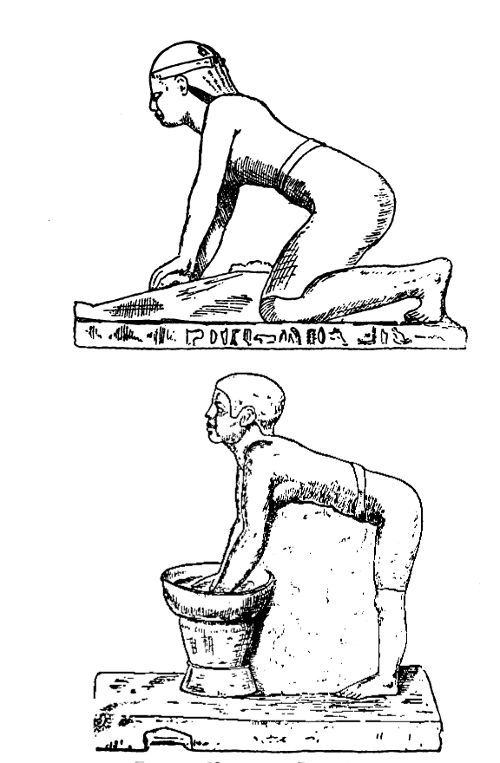
Egyptian Methods of Bread-Making.
Thanks to Assyrian art, and to the enduring qualities of bronze, we are able to see how that 25
26ancient people made their bread (at least in the camp) during the reign25 of Shalmaneser II., son of Assur-nasir-abli, who began to govern Assyria about the year 860 B.C., and died in 825 B.C. On the bronze bands of the great gates of Balawat are recorded the warlike doings of Shalmaneser II. in detail. In almost every camp that is represented are men depicted26 as preparing bread against the return of the, of course, victorious27 soldiery: we see them mealing the corn, kneading the dough, making it into flat, round cakes, and, finally, piling these up in large heaps ready for the hungry warriors28.
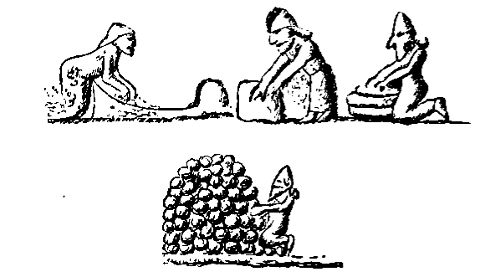
These gates were found in the year 1877 by Mr. Hormuzd Rassam, who, whilst excavating29 for the Trustees of the British Museum on the site of ancient Nineveh, began also excavations30 at a mound31 called Balawat, about 15 miles east of Mosul, and nine miles from Nimroud. Having received, as a present, 27
28before his departure for the East, some fragments of chased bronze, said to have been found in this mound, he naturally had the greatest wish to follow up the indication of a new store of antiquities32. He experienced some difficulty from the villagers of Balawat, as the mound had been used by them for some years as a burial ground, and their scruples33 having been overcome, the result was the finding of these beautiful bronzes in fragments. They were skilfully34 restored at the British Museum, where they now are, and rank among the best of Assyrian antiquities.

Egyptian Bread.
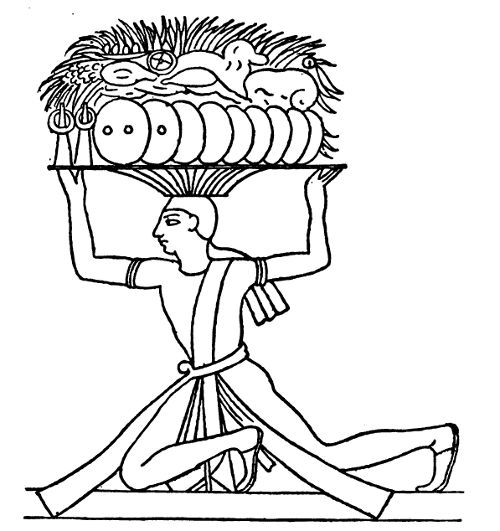
Egyptian Cake Seller.
The old Assyrians knew the value of irrigation in growing their crops, and the remains35 of aqueducts and hydraulic36 machines which remain in Babylonia bear witness to an advanced civilisation37; these are constructed of masonry38, which slanted39 up to the height of two feet, and, disposed at right angles to the river, they conducted the water from 200 to 2000 yards into the interior.
The food of the poor seems to have consisted of grain, such as wheat, or barley, moistened with water, kneaded in a bowl, rolled into cakes and baked in the hot ashes.

点击 收听单词发音
收听单词发音
 收听单词发音
收听单词发音
1
barley

|
|
| n.大麦,大麦粒 | |
参考例句: |
|
|
|
2
sorghum

|
|
| n.高粱属的植物,高粱糖浆,甜得发腻的东西 | |
参考例句: |
|
|
|
3
specimens

|
|
| n.样品( specimen的名词复数 );范例;(化验的)抽样;某种类型的人 | |
参考例句: |
|
|
|
4
reapers

|
|
| n.收割者,收获者( reaper的名词复数 );收割机 | |
参考例句: |
|
|
|
5
cultivation

|
|
| n.耕作,培养,栽培(法),养成 | |
参考例句: |
|
|
|
6
primitive

|
|
| adj.原始的;简单的;n.原(始)人,原始事物 | |
参考例句: |
|
|
|
7
strap

|
|
| n.皮带,带子;v.用带扣住,束牢;用绷带包扎 | |
参考例句: |
|
|
|
8
asses

|
|
| n. 驴,愚蠢的人,臀部 adv. (常用作后置)用于贬损或骂人 | |
参考例句: |
|
|
|
9
unison

|
|
| n.步调一致,行动一致 | |
参考例句: |
|
|
|
10
implements

|
|
| n.工具( implement的名词复数 );家具;手段;[法律]履行(契约等)v.实现( implement的第三人称单数 );执行;贯彻;使生效 | |
参考例句: |
|
|
|
11
winnow

|
|
| v.把(谷物)的杂质吹掉,扬去 | |
参考例句: |
|
|
|
12
shovels

|
|
| n.铲子( shovel的名词复数 );锹;推土机、挖土机等的)铲;铲形部份v.铲子( shovel的第三人称单数 );锹;推土机、挖土机等的)铲;铲形部份 | |
参考例句: |
|
|
|
13
determined

|
|
| adj.坚定的;有决心的 | |
参考例句: |
|
|
|
14
tellers

|
|
| n.(银行)出纳员( teller的名词复数 );(投票时的)计票员;讲故事等的人;讲述者 | |
参考例句: |
|
|
|
15
gathering

|
|
| n.集会,聚会,聚集 | |
参考例句: |
|
|
|
16
rippled

|
|
| 使泛起涟漪(ripple的过去式与过去分词形式) | |
参考例句: |
|
|
|
17
dough

|
|
| n.生面团;钱,现款 | |
参考例句: |
|
|
|
18
leavened

|
|
| adj.加酵母的v.使(面团)发酵( leaven的过去式和过去分词 );在…中掺入改变的因素 | |
参考例句: |
|
|
|
19
triangular

|
|
| adj.三角(形)的,三者间的 | |
参考例句: |
|
|
|
20
ornamented

|
|
| adj.花式字体的v.装饰,点缀,美化( ornament的过去式和过去分词 ) | |
参考例句: |
|
|
|
21
bakers

|
|
| n.面包师( baker的名词复数 );面包店;面包店店主;十三 | |
参考例句: |
|
|
|
22
baker

|
|
| n.面包师 | |
参考例句: |
|
|
|
23
conspiring

|
|
| 密谋( conspire的现在分词 ); 搞阴谋; (事件等)巧合; 共同导致 | |
参考例句: |
|
|
|
24
abode

|
|
| n.住处,住所 | |
参考例句: |
|
|
|
25
reign

|
|
| n.统治时期,统治,支配,盛行;v.占优势 | |
参考例句: |
|
|
|
26
depicted

|
|
| 描绘,描画( depict的过去式和过去分词 ); 描述 | |
参考例句: |
|
|
|
27
victorious

|
|
| adj.胜利的,得胜的 | |
参考例句: |
|
|
|
28
warriors

|
|
| 武士,勇士,战士( warrior的名词复数 ) | |
参考例句: |
|
|
|
29
excavating

|
|
| v.挖掘( excavate的现在分词 );开凿;挖出;发掘 | |
参考例句: |
|
|
|
30
excavations

|
|
| n.挖掘( excavation的名词复数 );开凿;开凿的洞穴(或山路等);(发掘出来的)古迹 | |
参考例句: |
|
|
|
31
mound

|
|
| n.土墩,堤,小山;v.筑堤,用土堆防卫 | |
参考例句: |
|
|
|
32
antiquities

|
|
| n.古老( antiquity的名词复数 );古迹;古人们;古代的风俗习惯 | |
参考例句: |
|
|
|
33
scruples

|
|
| n.良心上的不安( scruple的名词复数 );顾虑,顾忌v.感到于心不安,有顾忌( scruple的第三人称单数 ) | |
参考例句: |
|
|
|
34
skilfully

|
|
| adv. (美skillfully)熟练地 | |
参考例句: |
|
|
|
35
remains

|
|
| n.剩余物,残留物;遗体,遗迹 | |
参考例句: |
|
|
|
36
hydraulic

|
|
| adj.水力的;水压的,液压的;水力学的 | |
参考例句: |
|
|
|
37
civilisation

|
|
| n.文明,文化,开化,教化 | |
参考例句: |
|
|
|
38
masonry

|
|
| n.砖土建筑;砖石 | |
参考例句: |
|
|
|
39
slanted

|
|
| 有偏见的; 倾斜的 | |
参考例句: |
|
|
|
| 欢迎访问英文小说网 |

